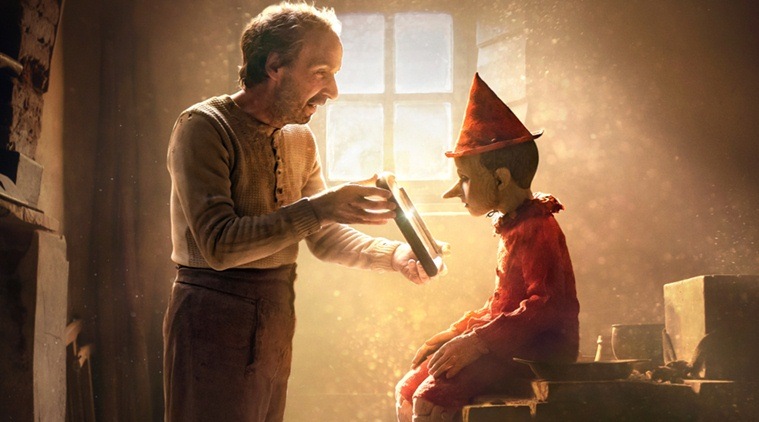 Matteo Garrone directorial Pinocchio stars Federico Ielapi and Roberto Benigni in the lead roles.
Matteo Garrone directorial Pinocchio stars Federico Ielapi and Roberto Benigni in the lead roles.
You know when someone’s lying, right? His nose grows longer. The Pinocchio legend, immortalized in the sweet Disney 1940 version, gets an update in Matteo Garrone’s live-action fantasy, starring Roberto Benigni as Geppetto the carpenter who brings to life a little boy carved from wood. Yes, the one with the pointy nose.
I come away from the film with mixed feelings. There’s no doubt that Garrone is a master of showcasing overflowing emotions. Benigni’s abjectly poor woodcarver’s delight in acquiring a ‘son’ knows no bounds. Pinocchio (Federico Ielapi) himself clings to a strange mix of innocence and willfulness as he runs away from home because he doesn’t want to go to school. And the characters he meets when he’s off adventuring all have heightened features. There’s so much underlining going on, that you start longing for some subtle notes.
It may have something to do with the difficulties of creating fairy-tales for grown-ups. How do you make us believe in magic, when you know that the world is going to hell, with handbaskets in short supply. Pinocchio is captured by a cruel puppet-master, but he manages to escape. He is then set upon by two greedy fellows who like to ‘nibble’ (a euphemism, if ever there was one, for devouring enormous quantities of meaty food), and who plan to separate the gullible boy from his money. And then he finds himself in the clutches of a twinkly-eyed gatherer of children with a very dark secret, and, from there, imprisoned in the belly of a giant fish, who is struggling itself with an overload of plastic rubbish: never let it be said that fairy-tales cannot be environment-friendly.
You can spy several influences at play here. A sort of pilgrim’s progress, with latter-day Bo-peep amongst many sheep. A Moby Dick variant, with many equivalents of the wicked witch. And strong Biblical accents. Among those who save Pinocchio from himself are a kindly shepherd, a motherly snail, and a beautiful fairy.
The final stroke, of the puppet turning into a flesh and blood boy, is satisfactory. Perhaps Pinocchio’s tale is nothing but a parable of a post-post-modern world full of deep-seated anxieties, insecurities and fear, where wrongs can be righted in inverse ways (bizarrely, a judge saves Pinocchio from years of unfair imprisonment when he admits to wrong-doing, rather than believe him when he protests his innocence ), and an elongated nose is not the only metric of a person indulging in falsehood.
The other highlight of the day is also a kind of fantasy but this time rooted in reality, with Berlin’s own favourite boy Christian Petzold’s Undine. Paula Beer plays chic historian-museum-guide Undine who helps visiting ‘national and international’ groups understand the complex history of Berlin. Under that calm exterior, though, is the roiling devastation caused by a lover (Jacob Matzchenz) who betrays her. A man (Franz Rogowski) who works as a diver, crashes the pity-party, and starts to lead her into another life where she can learn to heal.
On the surface, this is a story of love and deceit, the kind all lovers indulge in, time to time. But there’s a lot going on below, as the film reveals its pleasures slowly but steadily. Water is used both as metaphor and the real thing, the staff of life, as well as death. As Christoph dives into the depths, to check on the joins of some machinery, he invites Undine to swim with him. And there, they behold a sign (her name is engraved in metal) of beauty and mystery. How did it get there? Who did it?
Petzold’s skill of using these fantastical elements in what could be a mundane telling of a city’s history (there was this palace, then it was destroyed, then it was re-built and so on) slowly draws us in. Undine’s relationship with water is complicated, and she may have skills which we don’t know about. A shocking death occurs, telling us that love, when it curdles, can turn into a hatred that never really fades. And, at the same time, there can be another kind of love, which can redeem us, and make us whole.
Express at Berlinale 2020 | Day 3 | Day 2 | Day 1
***
This year’s Berlinale feels different for several reasons, not least of which that it is in the third week of February rather than the first. But the one which directly impacts starving, on-the-run film critics who have no time to sit and eat, is the removal of the food vans just across from the Palast and Cinemaxx screens. So here I am, sheltering from the thin rain that’s fallen all day, munching on an apple crumble. What was that, about having no bread? Our fairy-tales are full of caffeine and cake, and a sugar rush is the only way to survive a four-film-meetings-pressers-day, calories be damned.